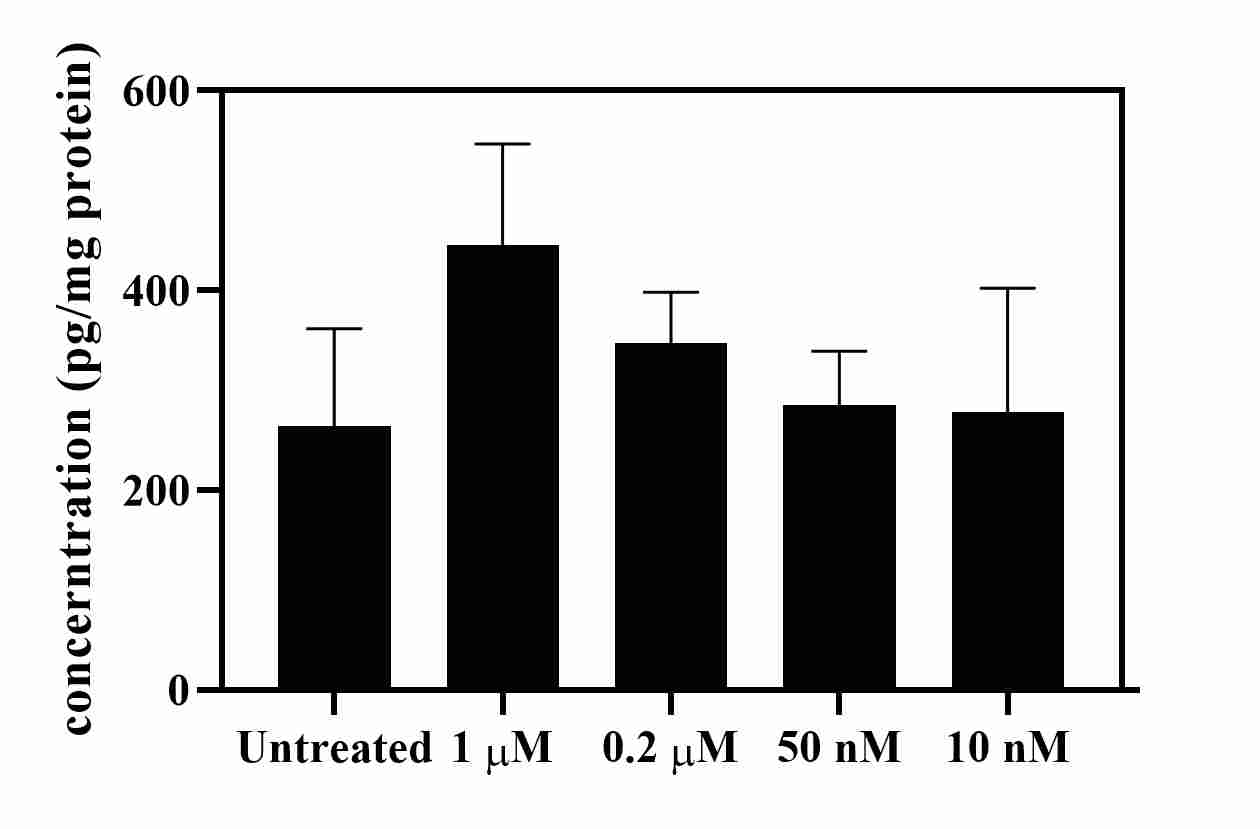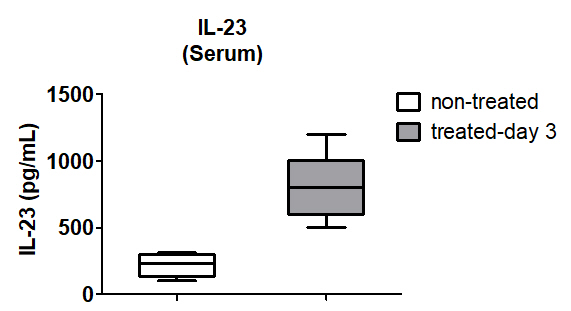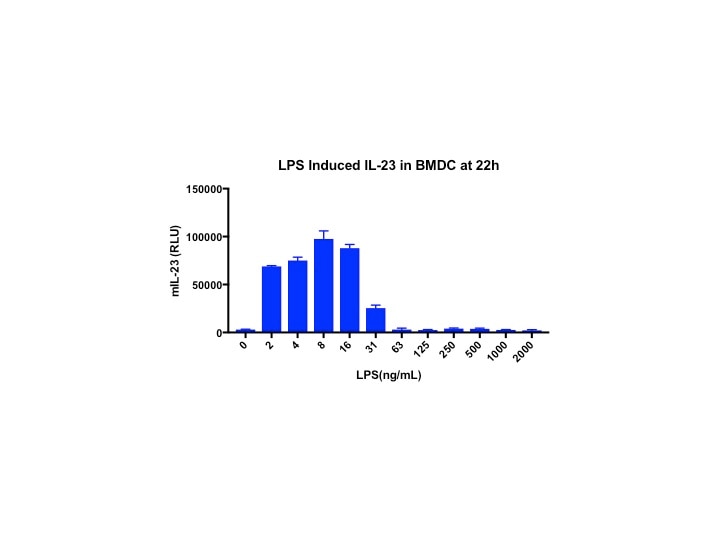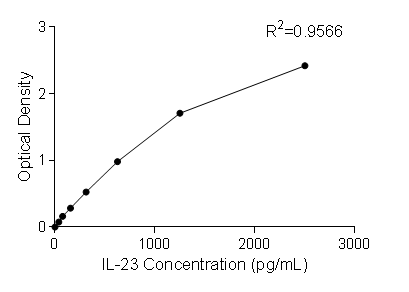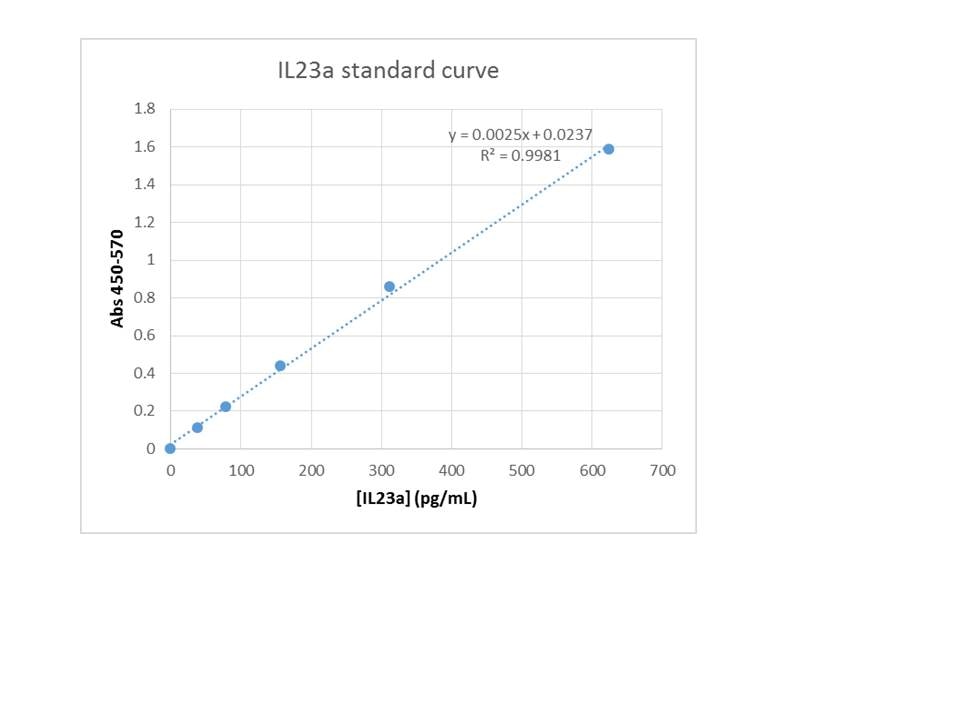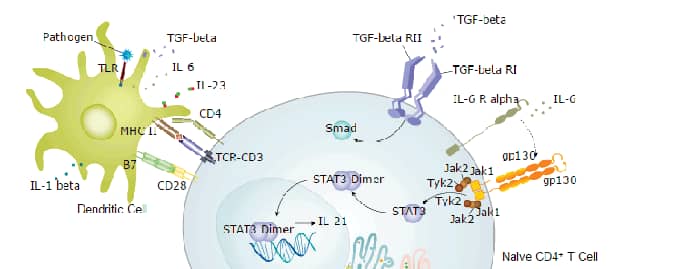Mouse IL-23 DuoSet ELISA Summary
* Provided that the recommended microplates, buffers, diluents, substrates and solutions are used, and the assay is run as summarized in the Assay Procedure provided.
This DuoSet ELISA Development kit contains the basic components required for the development of sandwich ELISAs to measure natural and recombinant mouse IL-23. The suggested diluent is suitable for the analysis of most cell culture supernate samples. Diluents for complex matrices, such as serum and plasma, should be evaluated prior to use in this DuoSet.
Product Features
- Optimized capture and detection antibody pairings with recommended concentrations save lengthy development time
- Development protocols are provided to guide further assay optimization
- Assay can be customized to your specific needs
- Economical alternative to complete kits
Kit Content
- Capture Antibody
- Detection Antibody
- Recombinant Standard
- Streptavidin conjugated to horseradish-peroxidase (Streptavidin-HRP)
Other Reagents Required
DuoSet Ancillary Reagent Kit 2 (5 plates): (Catalog # DY008) containing 96 well microplates, plate sealers, substrate solution, stop solution, plate coating buffer (PBS), wash buffer, and Reagent Diluent Concentrate 2.
The components listed above may be purchased separately:
PBS: (Catalog # DY006), or 137 mM NaCl, 2.7 mM KCl, 8.1 mM Na2HPO4, 1.5 mM KH2PO4, pH 7.2 - 7.4, 0.2 µm filtered
Wash Buffer: (Catalog # WA126), or 0.05% Tween® 20 in PBS, pH 7.2-7.4
Reagent Diluent: (Catalog # DY995), or 1% BSA in PBS, pH 7.2-7.4, 0.2 µm filtered
Substrate Solution: 1:1 mixture of Color Reagent A (H2O2) and Color Reagent B (Tetramethylbenzidine) (Catalog # DY999)
Stop Solution: 2 N H2SO4 (Catalog # DY994)
Microplates: R&D Systems (Catalog # DY990)
Plate Sealers: ELISA Plate Sealers (Catalog # DY992)
Scientific Data
Product Datasheets
Preparation and Storage
Background: IL-23
IL-23 (Interleukin-23) is a disulfide-linked cytokine composed of a p19 subunit that is unique to IL-23 and a p40 subunit that is shared with IL-12. It is produced by activated macrophages, microglia, and monocyte-derived dendritic cells in response to pathogens. IL-23 induces the earliest recruitment of neutrophils to the site of infection and promotes the development and maintenance of Th17 cells. It also enhances the development of Th17 mediated autoimmunity and tumor progression. IL-23 signals through a receptor complex consisting of IL-12 R beta 1 and IL-23 R. This complex is expressed in mouse Th1 and Th2 cells, bone marrow dendritic cells, activated macrophages and CD4+ CD45Rb(low) memory T cells.
Assay Procedure
GENERAL ELISA PROTOCOL
Plate Preparation
- Dilute the Capture Antibody to the working concentration in PBS without carrier protein. Immediately coat a 96-well microplate with 100 μL per well of the diluted Capture Antibody. Seal the plate and incubate overnight at room temperature.
- Aspirate each well and wash with Wash Buffer, repeating the process two times for a total of three washes. Wash by filling each well with Wash Buffer (400 μL) using a squirt bottle, manifold dispenser, or autowasher. Complete removal of liquid at each step is essential for good performance. After the last wash, remove any remaining Wash Buffer by aspirating or by inverting the plate and blotting it against clean paper towels.
- Block plates by adding 300 μL Reagent Diluent to each well. Incubate at room temperature for a minimum of 1 hour.
- Repeat the aspiration/wash as in step 2. The plates are now ready for sample addition.
Assay Procedure
- Add 100 μL of sample or standards in Reagent Diluent, or an appropriate diluent, per well. Cover with an adhesive strip and incubate 2 hours at room temperature.
- Repeat the aspiration/wash as in step 2 of Plate Preparation.
- Add 100 μL of the Detection Antibody, diluted in Reagent Diluent, to each well. Cover with a new adhesive strip and incubate 2 hours at room temperature.
- Repeat the aspiration/wash as in step 2 of Plate Preparation.
- Add 100 μL of the working dilution of Streptavidin-HRP to each well. Cover the plate and incubate for 20 minutes at room temperature. Avoid placing the plate in direct light.
- Repeat the aspiration/wash as in step 2.
- Add 100 μL of Substrate Solution to each well. Incubate for 20 minutes at room temperature. Avoid placing the plate in direct light.
- Add 50 μL of Stop Solution to each well. Gently tap the plate to ensure thorough mixing.
- Determine the optical density of each well immediately, using a microplate reader set to 450 nm. If wavelength correction is available, set to 540 nm or 570 nm. If wavelength correction is not available, subtract readings at 540 nm or 570 nm from the readings at 450 nm. This subtraction will correct for optical imperfections in the plate. Readings made directly at 450 nm without correction may be higher and less accurate.
Citations for Mouse IL-23 DuoSet ELISA
R&D Systems personnel manually curate a database that contains references using R&D Systems products. The data collected includes not only links to publications in PubMed, but also provides information about sample types, species, and experimental conditions.
24
Citations: Showing 1 - 10
Filter your results:
Filter by:
-
Agr2-associated ER stress promotes adherent-invasive E.�coli dysbiosis and triggers CD103+ dendritic cell IL-23-dependent ileocolitis
Authors: M Viladomiu, M Khounlotha, B Dogan, SF Lima, A Elsaadi, E Cardakli, JG Castellano, C Ng, J Herzog, AA Schoenborn, M Ellermann, B Liu, S Zhang, AS Gulati, RB Sartor, KW Simpson, SM Lipkin, RS Longman
Cell Reports, 2022-11-15;41(7):111637.
Species: Mouse, Transgenic Mouse
Sample Types: Cell Culture Supernates, Tissue Culture Supernates
-
The antimicrobial peptide cathelicidin drives development of experimental autoimmune encephalomyelitis in mice by affecting Th17 differentiation
Authors: KJ Smith, D Minns, BJ McHugh, RK Holloway, R O'Connor, A Williams, L Melrose, R McPherson, VE Miron, DJ Davidson, E Gwyer Find
PloS Biology, 2022-08-26;20(8):e3001554.
Species: Mouse
Sample Types: CSF
-
Lithocholic acid inhibits dendritic cell activation by reducing intracellular glutathione via TGR5 signaling
Authors: J Hu, Y Zhang, S Yi, C Wang, X Huang, S Pan, J Yang, G Yuan, S Tan, H Li
International journal of biological sciences, 2022-07-11;18(11):4545-4559.
Species: Mouse
Sample Types: Cell Culture Supernates
-
ADP-ribosylating adjuvant reveals plasticity in cDC1 cells that drive mucosal Th17 cell development and protection against influenza virus infection
Authors: M Arabpour, C Lebrero-Fe, K Schön, A Strömberg, V Börjesson, K Lahl, M Ballegeer, X Saelens, D Angeletti, W Agace, N Lycke
Mucosal Immunology, 2022-04-13;0(0):.
Species: Mouse
Sample Types: Cell Culture Supernates
-
The phosphoinositide-3-kinase (PI3K)-delta inhibitor seletalisib impairs monocyte-derived dendritic cells maturation, APC function, and promotes their migration to CCR7 and CXCR4 ligands
Authors: F Scopelliti, L Mercurio, C Cattani, V Dimartino, C Albanesi, G Costanzo, C Mirisola, S Madonna, A Cavani
Journal of leukocyte biology, 2022-02-24;0(0):.
Species: Mouse
Sample Types: Cell Culture Supernates
-
Gut microbiota-mediated secondary bile acids regulate dendritic cells to attenuate autoimmune uveitis through TGR5 signaling
Authors: J Hu, C Wang, X Huang, S Yi, S Pan, Y Zhang, G Yuan, Q Cao, X Ye, H Li
Cell Reports, 2021-09-21;36(12):109726.
Species: Mouse
Sample Types: Cell Culture Supernates
-
The SNX-482 peptide from Hysterocrates gigas spider acts as an immunomodulatory molecule activating macrophages
Authors: J Munhoz, R Thomé, A Rostami, LLW Ishikawa, L Verinaud, C Rapôso
Peptides, 2021-09-16;146(0):170648.
Species: Mouse
Sample Types: Cell Culture Supernates
-
Neutralization of IL-33 modifies the type 2 and type 3 inflammatory signature of viral induced asthma exacerbation
Authors: KJ Warren, JA Poole, JM Sweeter, JM DeVasure, JD Dickinson, RS Peebles, TA Wyatt
Respiratory Research, 2021-07-15;22(1):206.
Species: Mouse
Sample Types: BALF
-
Cryptococcus gattii evades CD11b-mediated fungal recognition by coating itself with capsular polysaccharides
Authors: K Ueno, Y Otani, N Yanagihara, M Urai, A Nagamori, M Sato-Fukus, K Shimizu, N Saito, Y Miyazaki
European Journal of Immunology, 2021-03-30;0(0):.
Species: Mouse
Sample Types: Cell Culture Supernates
-
CD137 Signaling Regulates Acute Colitis via RALDH2-Expressing CD11b-CD103+ DCs
Authors: J Jin, IH Jung, SH Moon, S Jeon, SJ Jeong, SK Sonn, S Seo, MN Lee, EJ Song, HY Kweon, S Kim, TK Kim, J Kim, HR Cho, JH Choi, B Kwon, GT Oh
Cell Rep, 2020-03-24;30(12):4124-4136.e5.
Species: Mouse
Sample Types: Cell Culture Supernates
-
IL-33 drives group 2 innate lymphoid cell-mediated protection during Clostridium difficile infection
Authors: AL Frisbee, MM Saleh, MK Young, JL Leslie, ME Simpson, MM Abhyankar, CA Cowardin, JZ Ma, P Pramoonjag, SD Turner, AP Liou, EL Buonomo, WA Petri
Nat Commun, 2019-06-20;10(1):2712.
Species: Mouse
Sample Types: Tissue Homogenates
-
Targeting dendritic cells to accelerate T-cell activation overcomes a bottleneck in tuberculosis vaccine efficacy
Nat Commun, 2016-12-22;7(0):13894.
Species: Mouse
Sample Types: Cell Culture Supernates
-
Transcriptional and functional characterization of CD137L-dendritic cells identifies a novel dendritic cell phenotype
Sci Rep, 2016-07-19;6(0):29712.
Species: Human
Sample Types: Cell Culture Supernates
-
Memory Th1 Cells Are Protective in Invasive Staphylococcus aureus Infection.
Authors: Brown A, Murphy A, Lalor S, Leech J, O'Keeffe K, Mac Aogain M, O'Halloran D, Lacey K, Tavakol M, Hearnden C, Fitzgerald-Hughes D, Humphreys H, Fennell J, van Wamel W, Foster T, Geoghegan J, Lavelle E, Rogers T, McLoughlin R
PLoS Pathog, 2015-11-05;11(11):e1005226.
Species: Mouse
Sample Types: Cell Culture Supernates
-
Inflammasome activation contributes to interleukin-23 production in response to Clostridium difficile.
Authors: Cowardin C, Kuehne S, Buonomo E, Marie C, Minton N, Petri W
MBio, 2015-01-27;6(1):.
Species: Mouse
Sample Types: Cell Culture Supernates
-
Lymphotoxin beta receptor signaling limits mucosal damage through driving IL-23 production by epithelial cells.
Authors: Macho-Fernandez E, Koroleva E, Spencer C, Tighe M, Torrado E, Cooper A, Fu Y, Tumanov A
Mucosal Immunol, 2014-09-03;8(2):403-13.
Species: Mouse
Sample Types: Tissue Homogenates
-
IL-17 contributes to neutrophil recruitment but not to control of viral replication during acute mouse adenovirus type 1 respiratory infection.
Authors: McCarthy M, Zhu L, Procario M, Weinberg J
Virology, 2014-04-19;456(0):259-67.
Species: Mouse
Sample Types: BALF
-
Staphylococcus aureus infection of mice expands a population of memory gammadelta T cells that are protective against subsequent infection.
Authors: Murphy A, O'Keeffe K, Lalor S, Maher B, Mills K, McLoughlin R
J Immunol, 2014-03-12;192(8):3697-708.
Species: Mouse
Sample Types: Peritoneal Lavage Fluid
-
Nod1 and Nod2 enhance TLR-mediated invariant NKT cell activation during bacterial infection.
Authors: Selvanantham T, Escalante N, Cruz Tleugabulova M, Fieve S, Girardin S, Philpott D, Mallevaey T
J Immunol, 2013-10-25;191(11):5646-54.
Species: Mouse
Sample Types: Cell Culture Supernates
-
Influence of hypoxia-inducible factor 1-alpha on dendritic cell differentiation and migration.
Authors: Kohler T, Reizis B, Johnson RS, Weighardt H, Forster I
Eur. J. Immunol., 2012-05-01;42(5):1226-36.
Species: Mouse
Sample Types: Cell Culture Supernates
-
Role of Toll interleukin-1 receptor (IL-1R) 8, a negative regulator of IL-1R/Toll-like receptor signaling, in resistance to acute Pseudomonas aeruginosa lung infection.
Authors: Veliz Rodriguez T, Moalli F, Polentarutti N, Paroni M, Bonavita E, Anselmo A, Nebuloni M, Mantero S, Jaillon S, Bragonzi A, Mantovani A, Riva F, Garlanda C
Infect. Immun., 2011-10-24;80(1):100-9.
Species: Mouse
Sample Types: Serum
-
The encephalitogenicity of T(H)17 cells is dependent on IL-1- and IL-23-induced production of the cytokine GM-CSF.
Authors: El-Behi M, Ciric B, Dai H
Nat. Immunol., 2011-04-24;12(6):568-75.
Species: Mouse
Sample Types: Cell Culture Supernates
-
A critical role for C5L2 in the pathogenesis of experimental allergic asthma.
Authors: Zhang X, Schmudde I, Laumonnier Y, Pandey MK, Clark JR, Konig P, Gerard NP, Gerard C, Wills-Karp M, Kohl J
J. Immunol., 2010-10-25;185(11):6741-52.
Species: Mouse
Sample Types: Cell Culture Supernates
-
Importance of TLR2 in the direct response of T lymphocytes to Schistosoma mansoni antigens.
Authors: Burton OT, Gibbs S, Miller N, Jones FM, Wen L, Dunne DW, Cooke A, Zaccone P
Eur. J. Immunol., 2010-08-01;40(8):2221-9.
Species: Mouse
Sample Types: Cell Culture Supernates
FAQs
No product specific FAQs exist for this product, however you may
View all ELISA FAQsReviews for Mouse IL-23 DuoSet ELISA
Average Rating: 4.8 (Based on 6 Reviews)
Have you used Mouse IL-23 DuoSet ELISA?
Submit a review and receive an Amazon gift card.
$25/€18/£15/$25CAN/¥75 Yuan/¥2500 Yen for a review with an image
$10/€7/£6/$10 CAD/¥70 Yuan/¥1110 Yen for a review without an image
Filter by:
The ELISA kit itself had a pretty lengthy and involved procedure in terms of incubation times and extra washes compared to most kits I have used. Overnight coating with primary,binding, then probing with a biotinylated capture antibody and then a detection step with streptavidin-HRP. Not as quick as other kits, however the signal/noise was excellent.

